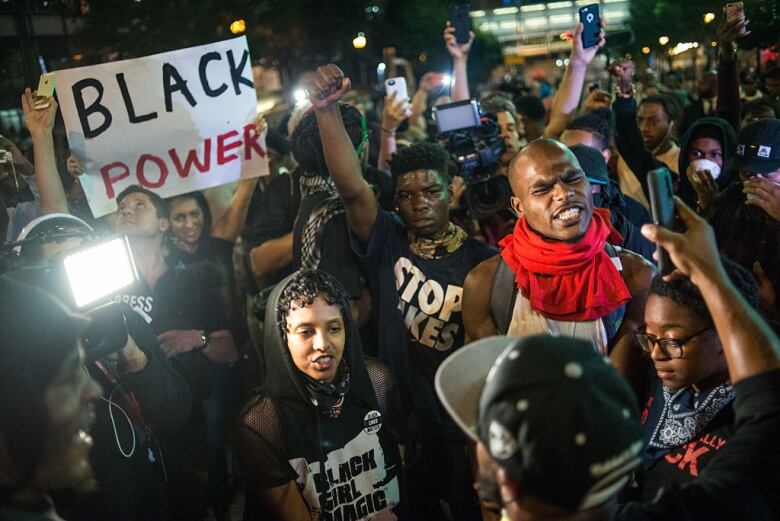Kaepernick and the cost of protesting police violence


by Brent Bambury (@notrexmurphy)
When Colin Kaepernick remained seated during the national anthem in a preseason NFL game on August 14, no one noticed the 49ers quarterback had begun a protest that would shake pro sports.
It took 12 days for media to perceive Kaepernick's gesture and two more for him to explain that he was showing solidarity for oppressed people of colour, and giving a voice to those who had none.
"I'm in the position where I can do that and I'm going to do that for people that can't," Kaepernick explained.
"It's something that can unify this team. It's something that can unify this country."
But in the weeks that followed, there was ample evidence the country was not unified, and that evidence came with blood.
Terence Crutcher, a 40-year-old black motorist, was gunned down roadside behind his vehicle by Tulsa police on Sept. 16. He was unarmed, and video evidence shows him apparently compliant.
Police in Charlotte, North Carolina are not releasing a video of their fatal shooting of Keith Lamont Scott who they said was brandishing a gun during a chance encounter on Tuesday. His family says the object in his hand may have been a Koran.

The deaths of these men bring Kaepernick's protest into a sharper focus. The violent protests in South Carolina that followed the death of Keith Lamont Scott come as athletes, amateur and professional, either join Kaepernick or criticize him.
This week, Kaepernick is on the cover of Time. He's also receiving death threats.
One of the people Kaepernick reached out to was Dr. Harry Edwards.
Edwards has negotiated the volatile intersection of pro sports, race and activism for most of his life. He received death threats in 1968 as he engineered the boycott of the Mexico City Olympics and worked with sprinters Tommie Smith and John Carlos whose "black power" salute rocked the games.
Since then he's advised the Commissioner of Baseball on diversity, worked with the Golden State Warriors of the NBA, and with Kaepernick's team, the 49ers. He's a scholar-activist, an academic and the author of several books.
I asked him what he told Kaepernick about the death threats.
"I told him that it comes with the territory," he said, "Especially in American society, if you are a black person protesting racism and injustice."
Athletes step out
That threat may have been why so many pro athletes remained apolitical during their playing career. But Kaepernick's protest has prompted some NFL players to join him. First it was his teammate Eric Reid. Then players like Brandon Marshall, Jeremy Lane and Marcus Peters, about two dozen in all, made their moves.
On September 11th, as the anthem played before their match with the Miami Dolphins, the Seattle Seahawks entire team locked arms in a gesture of support.
The Seahawks consulted Edwards before they made that decision. The meeting was supposed to last for 90 minutes, but it went on for hours. I asked him what happened when they talked.
"Well they have an extraordinarily bright and committed group of people. They are not uniform in their visions and views but they are extraordinarily articulate in terms of the issues and challenges that they are faced with," he said.
Were there players opposed to joining a protest?
"Oh, yeah. There were players on the team, who were white players in particular, not only who were adamantly opposed but who were silent."
"But what I loved about the Seahawks is that, coming out of that meeting, that was not uniformity, but there was unity."
"And so they stood up and locked arms. They made a video and made a statement."
What happens next
The anthem protest, if it spreads, could spell trouble for the NFL. A survey of fans indicates 44% would walk away from the sport if the protests continue.
But Harry Edwards thinks this could just be the beginning.

"It could go as far as the struggle in the 1960s with Thomas Smith and John Carlos and Muhammad Ali, Bill Russell, Jim Brown, Arthur Ashe, Curt Flood. We're still talking about those actions 50 years later. It can go as far as these athletes are willing to take it in terms of contributing to the struggle to form that more perfect union."
And will it spread given the violence in the streets in North Carolina and the death threats aimed at the athlete who started it all?
Harry Edwards recalls his advice to Kaepernick:
"One of the things that I told him was that the great lessons that came from leaders in the past, when people would step forward to make statements in terms of these critical situations, was that you simply accept the risk."
Kaepernick's team, the 49ers meet the Seattle Seahawks on Sunday in Washington.